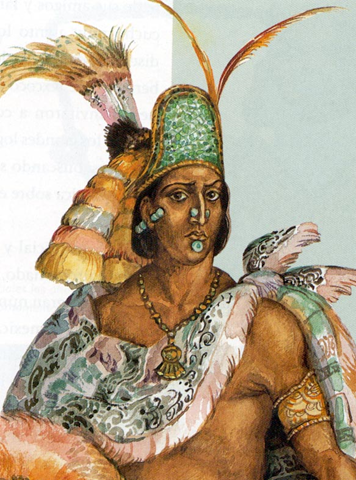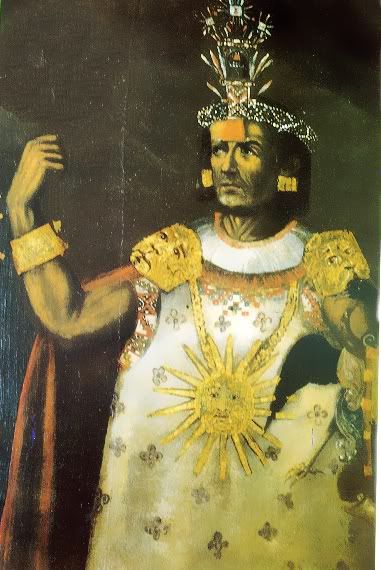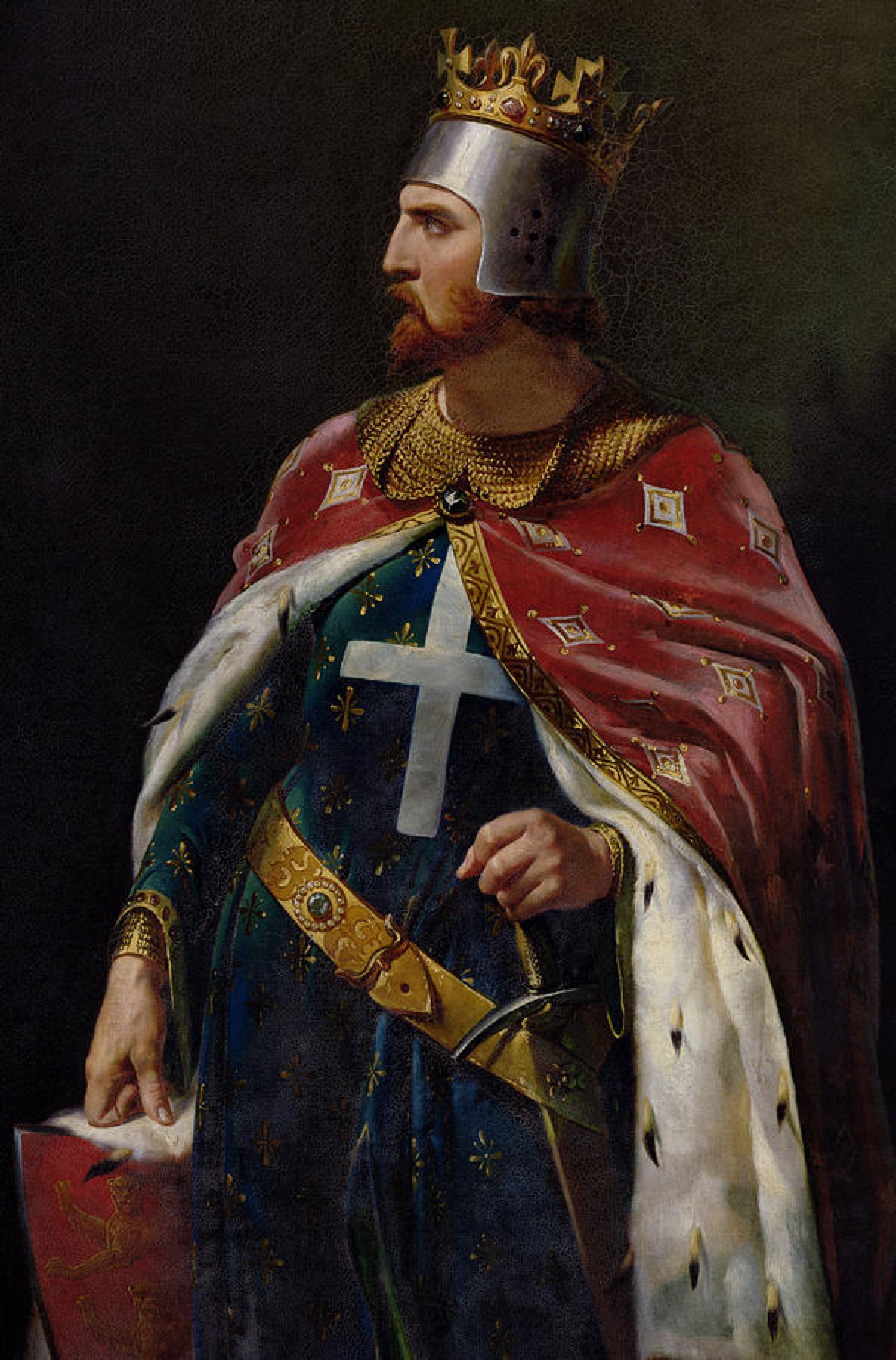
Oh, NOOooo!!!
Genevieve...the only other female royal person .... Oh, my dear...
 The Tupac family is a far less important family than the others, but still holds a high place in Inca society due to its historic deeds and accomplishments, and its current control over the affairs of Caczcoyna. The Tupac were originally religious explorers, set on finding the Limits of the land. They largely succeeded, actually, yet found themselves somewhat lost and completely disconnected with the Empire for over a thousand years. In that time, they sowed their seeds of mini-empires and fiefdoms throughout the relatively uninhabited plains and lowlands of the SE of Incaco. In time, they reconnected with the Empire, and later came to mount a settlement of their old lands in the now-Caczcoyna Hazco area. Although their political base remains in Mancho, and they are on very good terms with Mancha families and are strong in Mancha politics (in part due to control of Mancha trade with the SE of the empire, the goods of which mostly flow through the one highway connecting them to the west of the empire that goes bewteen Caczcoyna and Mancho), they have near-complete control within the SE of the Empire, in Caczcoyna and Cuzaca (an unimportant backwater for the time being). Their spiritual roots of discovery and exploration have stayed with them, in stark contrast to the fairly materialistic and hard-working Mancha, and as such they look to be the cultural and innovative center of the Empire, despite the SE's general lack of wealth and power (due in part to its agrarian nature and in part due to its utter seclusion from the centers of power).
The Tupac family is a far less important family than the others, but still holds a high place in Inca society due to its historic deeds and accomplishments, and its current control over the affairs of Caczcoyna. The Tupac were originally religious explorers, set on finding the Limits of the land. They largely succeeded, actually, yet found themselves somewhat lost and completely disconnected with the Empire for over a thousand years. In that time, they sowed their seeds of mini-empires and fiefdoms throughout the relatively uninhabited plains and lowlands of the SE of Incaco. In time, they reconnected with the Empire, and later came to mount a settlement of their old lands in the now-Caczcoyna Hazco area. Although their political base remains in Mancho, and they are on very good terms with Mancha families and are strong in Mancha politics (in part due to control of Mancha trade with the SE of the empire, the goods of which mostly flow through the one highway connecting them to the west of the empire that goes bewteen Caczcoyna and Mancho), they have near-complete control within the SE of the Empire, in Caczcoyna and Cuzaca (an unimportant backwater for the time being). Their spiritual roots of discovery and exploration have stayed with them, in stark contrast to the fairly materialistic and hard-working Mancha, and as such they look to be the cultural and innovative center of the Empire, despite the SE's general lack of wealth and power (due in part to its agrarian nature and in part due to its utter seclusion from the centers of power). The Yupanqui family is another major player in central bureaucracy politics. Newer than some of the more established families, the Yupanqui have still managed to ascend to the highest positions in government, at times even holding the throne. The family is fairly small, but is branching out, albeit at a slow pace. They made their name executing gold-silver arbitrage, making very rapid gains in wealth in an otherwise fairly static society where wealth accumulation is measured in centuries rather than decades. Somewhere around 220AD, the Yupanqui rose past the ranks of simple traders and into the ranks of the elite, and within another 25 years and risen to the top of that heap as well. Their small numbers have been their limiting factor, although perhaps this relative lack of size has been an asset as it would have certainly reduced the fear other established families and groups had of the Yupanqui during their rise (nothing a few gold tons couldn't fix, at least). Due to their extreme wealth, concentrated in only a few hands, the Yupanqui family members hold an unusual number of high positions for their size, with individual members vying with the other great players for the title of "richest men in the Empire".
The Yupanqui family is another major player in central bureaucracy politics. Newer than some of the more established families, the Yupanqui have still managed to ascend to the highest positions in government, at times even holding the throne. The family is fairly small, but is branching out, albeit at a slow pace. They made their name executing gold-silver arbitrage, making very rapid gains in wealth in an otherwise fairly static society where wealth accumulation is measured in centuries rather than decades. Somewhere around 220AD, the Yupanqui rose past the ranks of simple traders and into the ranks of the elite, and within another 25 years and risen to the top of that heap as well. Their small numbers have been their limiting factor, although perhaps this relative lack of size has been an asset as it would have certainly reduced the fear other established families and groups had of the Yupanqui during their rise (nothing a few gold tons couldn't fix, at least). Due to their extreme wealth, concentrated in only a few hands, the Yupanqui family members hold an unusual number of high positions for their size, with individual members vying with the other great players for the title of "richest men in the Empire".

 King Richard decided that England's African adventure was over. He signed a treaty with the Ottoman Turks to hand over control of England's north African lands to finally wash his hands of that dry, useless continent. English citizens from Carthage and Arthurton had little desire to live as part of the Ottoman Empire and be ruled by Jewish masters. They readily joined Sir Walter Raleigh in his South American venture. They founded colonies east of Plymouth, Georgetown, named after St. George the patron saint of England, and Williamsburg, named after King William, the Conqueror who had first won England for Christ. These were the first Christian communities in the Americas.
King Richard decided that England's African adventure was over. He signed a treaty with the Ottoman Turks to hand over control of England's north African lands to finally wash his hands of that dry, useless continent. English citizens from Carthage and Arthurton had little desire to live as part of the Ottoman Empire and be ruled by Jewish masters. They readily joined Sir Walter Raleigh in his South American venture. They founded colonies east of Plymouth, Georgetown, named after St. George the patron saint of England, and Williamsburg, named after King William, the Conqueror who had first won England for Christ. These were the first Christian communities in the Americas.  Resistance was dealt with sternly, but otherwise England looked upon America as backwards children in need of proper education and guidance. The slaves, mistresses and resources taken from the land were merely just payment for the civilizing influence England brought. Viceroy Cornwallis worked to stamp out the backwards native language, culture and religion. Children were instructed exclusively in English and speaking the native American tongue was outlawed. Viceroy Cornwallis expected their primitive tongue would soon go extinct. English styles of dress, poetry, music and literature were spread as well. Cornwallis also brought with him superior English farming techniques and other advanced technology to improve the lives of the natives. Through proper education and discipline, he was confident the American natives could be properly civilized.
Resistance was dealt with sternly, but otherwise England looked upon America as backwards children in need of proper education and guidance. The slaves, mistresses and resources taken from the land were merely just payment for the civilizing influence England brought. Viceroy Cornwallis worked to stamp out the backwards native language, culture and religion. Children were instructed exclusively in English and speaking the native American tongue was outlawed. Viceroy Cornwallis expected their primitive tongue would soon go extinct. English styles of dress, poetry, music and literature were spread as well. Cornwallis also brought with him superior English farming techniques and other advanced technology to improve the lives of the natives. Through proper education and discipline, he was confident the American natives could be properly civilized. 
Comment